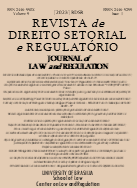A (in)observância das premissas estabelecidas pelo Novo Marco Regulatório do Saneamento Básico para a criação das unidades regionais e microrregiões de saneamento: análise da Lei Estadual nº 17.383/2021 de São Paulo
Keywords:
Sanitation. Regional Units and Microregion. Unconstitutionality. Cooperative Federalism. Principle of Isonomy.Abstract
[Purpose] To analyze the subnational legislation regarding regionalization of sanitation, to identify whether the premises established in the New Regulatory Framework for Basic Sanitation were observed (MRSN).
[Methodology/approach/design] The Federal Law no. 14,026/2020 amended Federal Law no. 11,445/2007 with paradigm shifts regarding contract relationship in the segment. The sector, which has always been centered around the public-public partnership agreement, provided for in article 13 of Law no. 11,107/2005, started to privilege public-private partnership contracts for the execution of services. To adapt the business environment to the new regulatory model, some institutes were planned, for example, the regionalization, whose objective is to create regional units and micro-regions of basic sanitation, to assemble municipalities – the service holders – in blocks. Regionalization, which in the form of regional units and micro-regions is the responsibility of State Entities for their definitions, was elevated to the fundamental principle of sanitation. The main purposes are the achievement of universalization, technical and economic-financial feasibility and gains of scale. To achieve these purposes, it is crucial that State Entities, when formatting these units, pay attention to technical issues – for example, the configuration of regional hydrographical basins – as well as to the economic-financial sustainability of all combinations of municipalities.
[Findings] It is argued that, in the exercise of these powers, the States neglected such factors, as in the State Law nº 17.383/2021 of the State of São Paulo. Failure to comply with technical and economic-financial issues can lead to unconstitutionality, especially due to an offense against the principles of cooperative federalism and equality between Municipal Entities, the holders of basic sanitation services.
References
ALEXY, Robert. Teoria dos direitos fundamentais. Tradução de Virgílio Afonso da Silva. São Paulo: Malheiros, 2008. (Coleção teoria & direito público)
BOBBIO, Norberto. Da estrutura à função. Barueri: Editora Manole, 2006.
CÂMARA MUNICIPAL DE PAULÍNIA. Moção nº 93, de 2021. “De alerta sobre os possíveis impactos negativos do PL nº 251/2021, que dispõe sobre a criação de unidades regionais de saneamento básico”. Disponível em: < http://siave.camarapaulinia.sp.gov.br/arquivo?Id=132979>. Acesso em 09 jun. 2022.
CARVALHO, Paulo de Barros. Curso de direito Tributário, 12ªed. ver. amp. São Paulo: Saraiva, 1999.
ESTADO DE SÃO PAULO. A Regionalização da Prestação dos Serviços de Saneamento Básico segundo o Novo Marco LEGAL. São Paulo, 2021. Disponível em: <https://sigrh.sp.gov.br/public/uploads/documents//CRH/20821/regionalizacao-marco-saneamento.pdf>. Acesso em: 13 out. 2021.
FENSTERSEIFER, Tiago; SARLET, Ingo Wolfang. Direito Constitucional Ambiental: Constituição, Direitos Fundamentais e Proteção do Ambiente. São Paulo: Revista dos Tribunais, 2014.
FORGIARINI, Francisco Rossarolla, SILVEIRA, André Luiz Lopes da. SILVEIRA, Geraldo Lopes da. Saneamento Básico e Recursos Hídricos: benefícios da interface das políticas de gestão. In: XVII Simpósio Brasileiro de Recursos Hídricos, 2007, São Paulo. Anais eletrônicos. Disponível em: <https://abrh.s3.sa-east-1.amazonaws.com/Sumarios/19/ba7393b5be4f901ec99205d40b845e48_f352d89d0368f21df0fa3729444e553e.pdf>. Acesso em: 13 out. 2021.
GARCIA, Maria da Glória. Estudos sobre o Princípio da Igualdade. Coimbra: Edições Almedina, 2005.
INSTITUTO ÁGUA E SANEAMENTO (IAS) e INSTITUTO DEMOCRACIA E SUSTENTABILIDADE (IDS). Desafios e riscos da implementação do marco legal do saneamento no estado de São Paulo: análise do PL 251/2021. Junho/2021. Disponível em: <https://www.idsbrasil.org/wp-content/uploads/2021/07/PL251_Nota-Tecnica_IAS_IDS.pdf>. Acesso em: 13 out. 2021.
LIMA NETO, IRAN. Proposta metodológica para análise de viabilidade econômico-financeira da universalização e prestação dos serviços de saneamento básico. Revista Dae, São Paulo, ed. 193, set./dez. 2013, p. 56-65. Disponível em: <http://doi.editoracubo.com.br/10.4322/dae.2014.117>. Acesso em 25 out. 2021.
MELLO, Celso Antônio Bandeira. O conteúdo jurídico do princípio da igualdade. 3ª ed. São Paulo: Editores Malheiros, 1998.
____________________________. Princípio da isonomia: desequiparações proibidas e permitidas. Revista Trimestral de Direito Público, n. 1, 1993.
PEREIRA, Cesar. Normas de referência da ANA (Agência Nacional de Águas e Saneamento Básico) e conflitos regulatórios. Curitiba: Informativo Justen, Pereira, Oliveira e Talamini nº 175, 2021. Disponível em: www.justen.com.br, acesso em 13 out. 2021.
NORMAS E JULGADOS
BRASIL. Supremo Tribunal Federal. Suspensão de Segurança nº 5.403, Relator Ministro Luiz Fux, julgado em 01 fev. 2021.
ESTADO DE SÃO PAULO. Projeto de Lei nº 251/2020. Disponível em: https://www.al.sp.gov.br/propositura/?id=1000366067. Acesso em 25/10/2021.
Downloads
Published
Issue
Section
License
Copyright (c) 2023 Journal of Law and Regulation

This work is licensed under a Creative Commons Attribution 4.0 International License.
By submitting this paper to the Journal of Law and Regulation, I hereby declare that I agree to the terms of the Creative Commons Attribution 4.0 International (CC BY 4.0), available at http://creativecommons.org/licenses/by/4.0.


